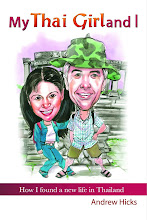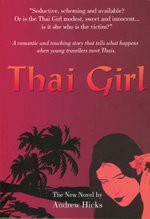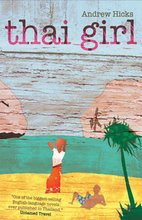

Cat’s oldest brother, Mungorn and his wife, Malee are rice farmers who work long hours trying to eke a living from the soil and to me their lives seem to be grindingly hard. They have three boys, fourteen year old twins, Gi and Gong and five year old Geng and, especially with further education looming, it’s hard for them to make ends meet. The pictures show them at harvest time and me with Geng on sports day getting our feet very muddy.
I have great admiration for them as they are unusual in making a life for themselves in the village rather than splitting up the family and migrating to the factories to earn a safe salary. Of all of Cat’s seven brothers and sisters, they are the only ones still settled here. The others have all left because it’s almost impossible to stay. Rice farming takes up only part of the year and brings in a limited amount of money, so both Mangorn and Malee have to find other paid work locally whenever they can.
Nonetheless, growing rice takes up a major part of their year and the climax comes in November with the harvest. When the rice has been cut, it’s laid out to dry, then gathered in a huge pile to be threshed. The thresher, a pale blue machine mounted on an old lorry, has been hired and is now standing by in the field.
First, Mungorn and Malee make an offering of lao khao or rice whisky to the spirits of the place, pouring a few drops onto the ground, while Malee’s Papa looks on. With the harvest now blessed, the engine of the thresher is started up. This is the big moment.
Today there’s a festival mood after many months of toil as the men toss the bundles of grain into the thresher, watched by the women who, despite the heat, are swathed up in clothes to keep out the dust. While the machine shoots a fountain of rice stalks high into the air, the precious trickle of brown grains slowly fills the big hessian bags. One by one the bags are lifted off the thresher, and it takes two strong men to move them. Meanwhile, Mungorn is keeping an eye on things, anxiously counting the full bags of rice.
It’s been a difficult year and the cost of credit, fuel, seed, insecticide and fertilizer have been rocketing. His crop of khao hawm mali, or Thai jasmine rice has been the first to ripen in the village and so he has just paid for it to be harvested over two days. More than a hundred people have been slowly advancing in lines across the fields, cutting the rice a handful at a time with their sickles. Only when he totals up the number of sacks will Mungorn know if there’s any money to be made from all the hard work.
If you have only a small farm, you won’t make much money from growing rice and while many families cultivate their small plots just to supply their own needs for the year, Mungorn has an entrepreneurial streak and is always looking for new opportunities.
He also cultivates some neighbouring fields under what I can only describe as a pledge of rice land. His neighbour, Oht, was in a financial pickle and desperately needed some immediate cash so Mungorn lent him 60,000 baht for a specifed period. No interest is paid on the loan but Mungorn (as if a mortgagee in possession), has the use of the land and cultivates it for his own benefit in lieu of interest. If at the end of the fixed term Oht fails to repay the 60,000 baht, the land is forfeited to Mungorn. As a complex deal, the agreement is recorded in writing and is verified by the village head and deposited at the ampur, the local village administrative authority. (This is as explained to me by Cat and if any reader can give me more info on this form of ‘mortgage’, I‘d love to hear from you at arhicks56@hotmail.com.)
Mungorn is thus immensely hard-working and determined. When he’s not cultivating rice, he’s looking after his cows or planting chillis, sugar cane and rubber on a small piece of land he's recently bought. He got it for a good price because it’s next to the forest where they cremate poor people who can’t afford to use the temple. And if he can ever get work such as cutting sugar cane or on a construction site nearby, he’ll be there.
At nights, on top of his day work, he works in Sangkha market, driving and offloading the trucks and pickups that arrive in the early hours. I’ve no idea when he sleeps. It’s a tough life and sometimes there are set-backs, like when the cow house burned down and one of the cows was killed, but I’ve never ever seen them dispirited or out of sorts. Malee is full of fun and laughter and with her radiant smile, always lifts the mood of everyone around her. They are a delightful couple and I only hope things work out for them.
For me, they represent all the very best qualities of the Isaan farmer. I wish them well but fear that their material rewards are few. I also feel that if Mungorn and Malee, with all their energy and competence cannot prosper as small scale rice farmers, then nobody ever will.
Somehow they personify all the problems of rural Thailand. The land is overpopulated and degraded. With sub-division down the generations, land holdings have become smaller and smaller and so the able bodied move to the cities. However desperately hard and cleverly you work as a small farmer, you'll only ever squeak by. The rewards for keeping your family together are there, but in material terms they are pathetically few.
I hesitate to call these people poor as they have preserved their family values and sense of community, but there will be no breakthrough to better themselves for the future. I can understand fully why farmers look to escape by playing the lottery and drinking too much alcohol but Mungorn and Malee never resort to this.
.
They are honest and hard working, their sons handsome and polite and I only wish that some good luck could come their way. If anyone could make sensible use of a windfall, it’s them.
























